Estimated Reading Time: 9 Minutes
Probably you have decided that buying a car in Costa Rica is much easier than bringing your old one. Bringing your own car only makes sense when you ship your household anyway or if your car has low mileage. But the hassle of bringing your own vehicle is often not worth it. Most new expats don’t realize they must pay high taxes to import their own car and won’t be saving any money.
Buying a car in Costa Rica or not is a major decision when moving to here. Another option is the excellent public transportation system or the well-known Uber taxis. Hopping on the bus is not for everyone, but it’s cheap. And once you have a residency card – DIMEX, and you’re over 65, it’s free. If you will be living around San José and don’t have experience driving in Costa Rica, Uber would be an excellent choice, particularly until you get your bearings. Download Uber on the app store or Google Play.
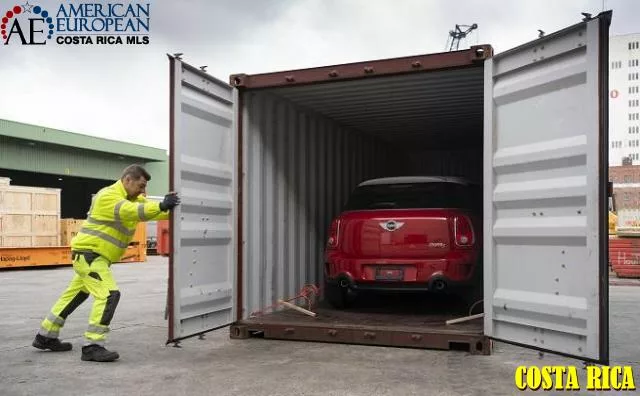
If you want to drive your own vehicle, here are
- the kinds and brands you should consider,
- where should you purchase it,
- and some common pitfalls you can avoid.
Buying a Car in Costa Rica or Abroad?
A common misconception among foreigners relocating is that you will save money by bringing a car here from overseas. There are some big drawbacks to trying this:
- You still have to pay the import duties, so cars are much more expensive here than elsewhere. Add insurance and shipping costs to the cost you will pay in the US.
- You’ll have to go through the process of clearing the car through customs, either yourself (good luck) or with a customs broker (who will charge you).
- If you buy a new car from a dealer in the US, the guarantee won’t be valid here.
- Driving a car from the U.S. might be a fun idea, but it’s also dangerous. Quora offers some good and bad experiences and recommendations.
- The car may be damaged in shipping or have parts stolen in transit. The insurance you buy may cover this damage, but it probably won’t, especially if it may have been pre-existing or unrelated to the container’s handling. If you bring any recreational vehicles, check on Morison Recreational Insurance before shipping them.
- For example, buying a car in Panama and driving it over the border won’t work. After three months, you must nationalize the car and pay the import duties.
- A new car from a dealership is exempt from the annual vehicle test Dekra (former Riteve) for four years. When you import a car yourself, the car must pass the emissions test first.
How much taxes will you pay?
Is there some compelling reason you must purchase abroad? Even when you plan to bring your own car, you will pay import tax on your car.
Brand new cars purchased at the local car dealers have tax rates not only applied to the Black Book value of the car but also to the shipping and insurance costs. You can check taxes to be paid on any car and any model on Autovalor. This is the Ministry of Finance – Customs Department website (Spanish only).
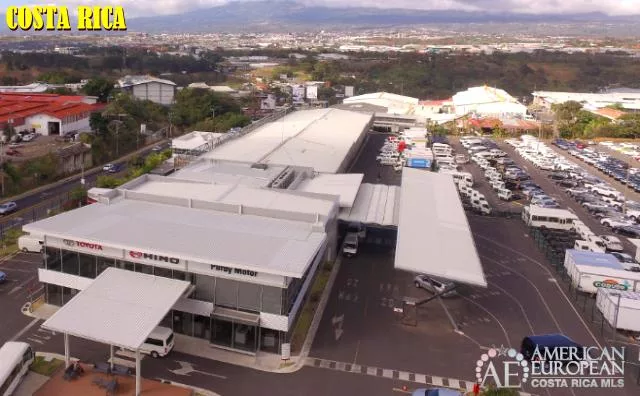
New Cars – Considerations
Imported cars pay duties depending on their age:
- Vehicles less than 3 years old have a duty rate of 52.28%
- 4-5 years old pay 63%
- 6 plus years old pay 79.02%.
Some cars have the same safety features and standard accessories as a car you would buy in the US; some are specifically sold on the Latin American market. Some brands that aren’t very popular in the US, like Suzuki, are excellent choices here. This is due to the relative popularity locally and specific selling points like high clearances and Four Wheel Drive. Some well-known brands in the U.S. are not very good choices for buying a car in Costa Rica, such as Infinity, Acura, Delorean, and Cadillac. Repairs will be very difficult as these brands have no local representation.
What to watch for
- Financing has improved dramatically in the last several years. Interest rates are higher than in the United States. Read Creditninja’s post for info on installment loans in the United States. Foreigners who don’t have legal residency or “authorized” income sources may encounter difficulty with financing, regardless of their credit rating. Interest rates for new car financing are just under 6% in dollars and over 8% in colones, depending on the lender.
- Check the car’s popularity in the secondary market before buying a car in Costa Rica. The more popular and respected cars will retain their resale value better and offer more options when you need spare parts.
- Check out the dealer’s reputation, service center, and time in business. Grupo Q, Purdy Motor, Agencia Datsun, EuroAutos, VETRASA & VEINSA have different reputations for inventories of parts and services and carry popular brands. Not that you have to stay away from others, but you have to do more research on each one of them before buying.
- Chinese cars are much cheaper now. Some, like MG, are made in China under British specifications. Larger brands like Toyota and Nissan do not trade cars made in China (yet).
- “New” cars – Most brands only have one authorized dealer because ours is a small market. But some makes have dealers that bring in 0 km cars that are “like new.” Often these are last year’s models that haven’t sold in Korea and are shipped here. This isn’t to say they aren’t good deals; you must read the ads carefully to know what you’re getting.
Buying from an individual vs. a Used Car Dealer
The used car dealer offers several advantages. The principal one is that they are legally bound to offer a 30-day guarantee on the transmission and motor. While a good mechanic will more than likely be able to steer you away from a real lemon, this guarantee is nice to have. Another advantage is that they can offer you financing on the cars they sell. And they’ll take your car as a trade-in, saving you the hassle of selling it.
However, you can sell your old car for a better price privately.
Another big advantage is that most dealers are direct importers. It’s no secret that the local roads are hazardous to the health of your car. An imported car has suffered much less abuse when compared to any car that has circulated in Costa Rica for a few years. This benefits the mechanical condition of the car a great deal. Also, many cars like Hyundai and Kia come from Korea, a small country with great roads. That means low mileage and generally good overall condition.
There are 2 scenarios where buying a car locally from an individual could be better. One case would be buying a 1-owner car from someone you know who is very meticulous about the care and maintenance of their vehicles. Another case may be someone leaving the country and desperate to sell the car at any price before they go. If you find a car well below the market value advertised, be very careful to ascertain why the price is so low. Because normally there is a reason: “If it’s too good to be true…”
Be extra careful when looking to buy a car from an individual; there are many scams.
Cars to buy – What Makes and models are the best for Costa Rica
The 3 most popular brands here are Toyota, Nissan, and Hyundai. You can’t go wrong by sticking with these brands for several reasons:
- Parts are readily available in almost any area of the country.
- Parts are generally less expensive than any other brand.
- These cars hold their resale value very well.
- Mechanics are familiar with these cars and have the necessary equipment for diagnosis and repair.
Suzuki, Mitsubishi, and Honda are also good brands that are popular and solid choices. You have much more freedom if you plan to buy a new car from a dealer and drive it into the ground. But it still won’t hurt to keep the above factors in mind. For example, Peugeot has entered the market here a big way, and Citroen has been trying to do the same thing.
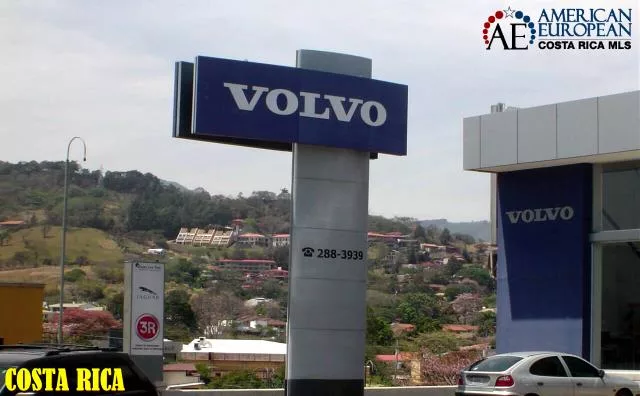
Economy vs. Power & Gasoline vs. Diesel
You must consider that in June 2023, regular gasoline costs ¢709/liter, and super gasoline ¢759/liter. Diesel costs ¢583/liter. Fuel prices vary a lot, as the regulating institution, Aresep, considers a price change every second Friday of the month due to import prices. The exchange rate of the colon also varies every day.
That means DON’T buy a V6 or V8 engine if you can possibly avoid it. Most automobiles here are between 1500 and 2000 cc for a gasoline engine. These motors have enough power to get up and down the mountains. But they won’t bankrupt you whenever you go to the gas station.
Diesel
If you often drive in rural areas or want a car that will withstand the potholes much better, you will consider a 4-wheel drive SUV or pickup truck. In this case, a diesel engine will be advisable. The minivans and SUVs with CRDI or turbo diesel intercooler engines with 2800 to 3000 cc displacement are excellent choices. You won’t see a real difference in acceleration or power; the diesel engine is more efficient than gasoline.
Gasoline engine
However, some factors might lead you to choose a gasoline engine:
• Off-road usage: If you are regularly going off-road, like to reach a secret surf spot or a remote farm, there are situations where you need the consistency in power that a gasoline engine provides.
• Infrequent use: If you drive short distances in a rural area or will drive the car infrequently, you might find that the difference in price for a diesel won’t be cost-effective. Many bargains are on the market from people trying to unload a gas hog. At the same time, large cars with diesel engines command a premium price in the market. If you aren’t driving that much, you might find that the diesel engine won’t pay for itself in the time frame that you will own the car.
Electric
Buying an electric car is now much cheaper because they have been exempt from import tax since 2018. There are still very few charging stations in rural areas, but they are growing fast. Do your homework if you’re interested in buying an electric car.
Title transfer
Last but not least is the title transfer. You will want the title in your name when buying a car here or when importing one. Some purchase the car in a corporation or S.A. In any case, you need a notary public – attorney to register a purchase-sale deed. The notary public registers this deed in the National Register, then the vehicle’s title is in your name. Even though the attorney should do this, always check the title yourself and make sure there are no liens or tickets on the car.
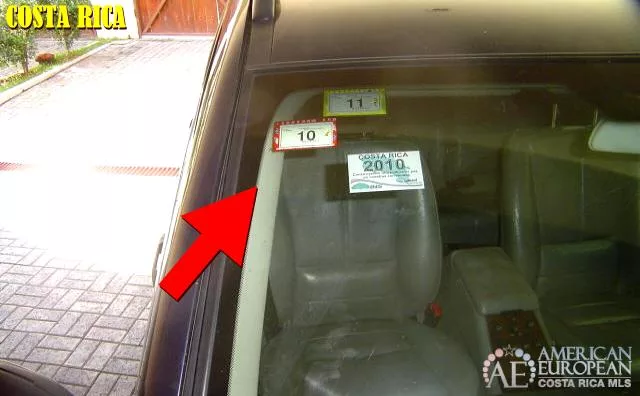
Marchamo
You must also know about the “marchamo” or road tax. Every car must pay the road tax every year, which you can pay between the 3rd week of October and the end of January.
You can check how much you must pay for your “marchamo” online.
Tax-Free Import
Since 2022, you can become a resident by applying as an investor by purchasing real estate for a registered value of $150,000. This form of residency allows for importing your household and two vehicles tax-free. If you decide to sell one of those vehicles within 10 years, you must cancel 30% of the car’s original cost when it was imported to the tax authorities. Aks your lawyer for more information on this.
Recommendation
Ask your preferred Costa Rica real estate agent for advice on buying a car in Costa Rica and to connect you with the right dealerships. You should look at cars in the same area where you will live in Costa Rica. Some people know the local market and speak English; they can help you find the right car for you for a fee. If you think this article is interesting, we have plenty of interesting articles for you every week, like, for example, about the marchamo, which is the annual road tax.
Author
Article by Russ Martin. Russ’s company has given marketing and web development services for many years. He and his wife, Kattia, now manage their own business, WheelsCR. WheelsCR assists ex-pats in buying a car in Costa Rica. We strongly recommend using their services.
Image by cookie_studio on Freepik


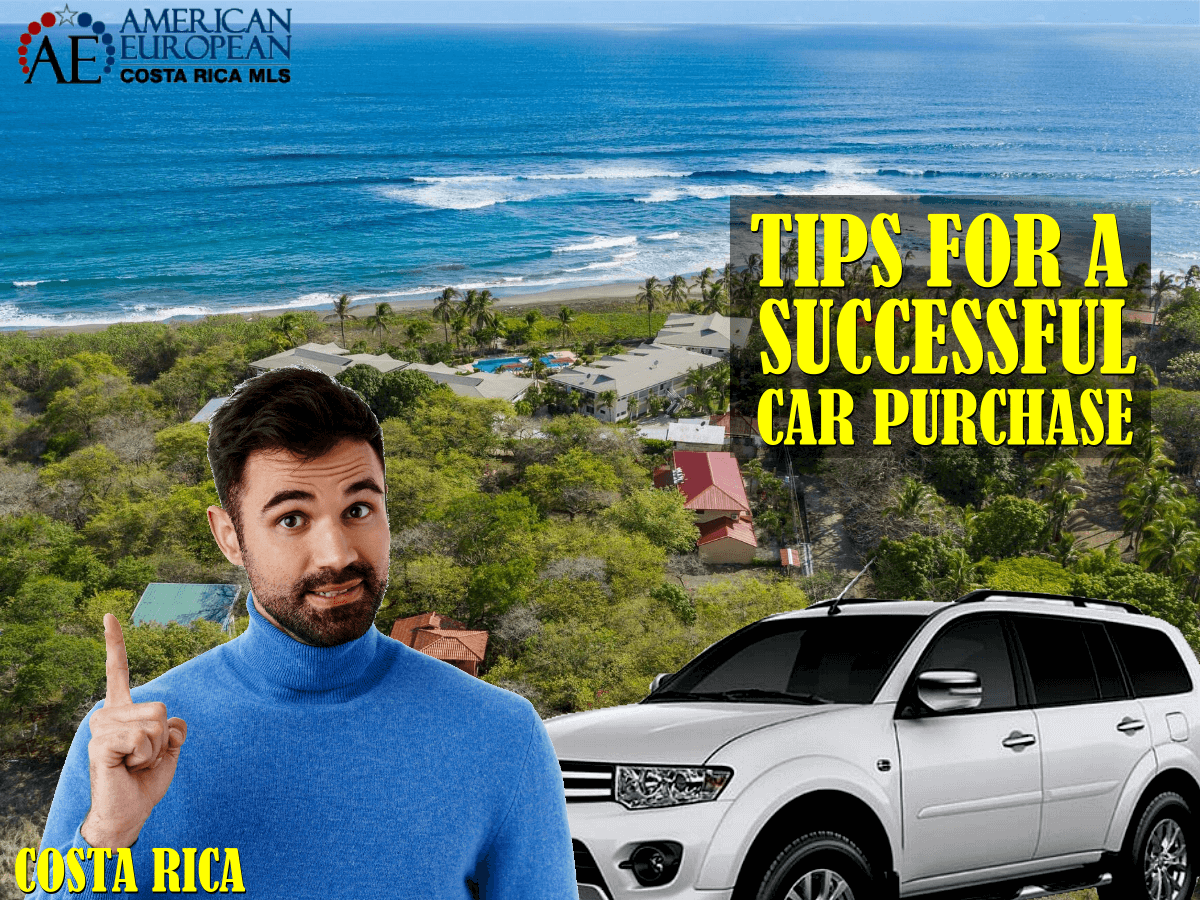
















2 Comments
Great tips! Buying a car in Costa Rica can be quite an adventure. Thanks for sharing these valuable insights to make the process smoother and more successful.
I would not buy a car at Groupo Purdy. I did. Big mistake !. I paid 107 thousand cash for a new ford and the nightmare started. It took months to get the car in my possession. They said getting it ready for months. The Bronco had scratches on its interior but not when I bought it. Finally took possession and months again to get tags through them. They act like they don’t like Americans. That’s the feeling I got. They also swapped tires without asking and only 4 so I had a useless spare. Told them but did not care. Don’t TRUST them !